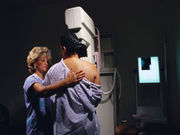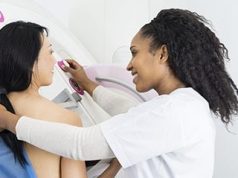Significant increase in self-reported likelihood of obtaining mammogram following intervention
MONDAY, Sept. 25, 2017 (HealthDay News) — Engaging American Muslim women may increase their likelihood of obtaining a mammogram, according to a study presented at the 10th AACR Conference on The Science of Cancer Health Disparities in Racial/Ethnic Minorities and the Medically Underserved, held from Sept. 25 to 28 in Atlanta.
Aasim Padela, M.D., from the University of Chicago, and colleagues used focus groups and interviews with women from Muslim organizations to identify beliefs regarding mammography, and interviewed the same target population to elicit ideas regarding intervention design. Fifty-two women participated in the two-session religiously-tailored mosque-based intervention.
The researchers found that following the intervention there was a significant increase in the before and after self-reported likelihood of obtaining a mammogram, and in breast cancer screening knowledge. Positive likelihood changes were significantly predicted by greater resonance with facilitator beliefs (odds ratio, 1.31). The odds of intending to get a mammogram were increased for participants with higher negative religious coping and greater resonance with facilitator beliefs (odds ratios, 1.33 and 1.44, respectively); those with higher religiosity and more resonance with barrier beliefs had significantly lower intentions (odds ratios, 0.72 and 0.72, respectively). Forty-two percent of participants had obtained a mammogram at the six-month follow-up.
“We believe that by engaging with such deeply held aspects of identity, we can meet people where they are and encourage them to uphold their beliefs in a way that also benefits their health,” Padela said in a statement.
Press Release
More Information
Copyright © 2017 HealthDay. All rights reserved.








